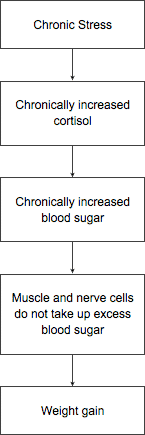Chronic Stress and Weight Gain
By Aurora Sedmak, ND
I have noticed a tendency for people who have long-term stress or multiple stressors in their lives often have weight gain. In this article I will discuss the physiology behind stress and weight gain, as well as give ways to identify, reduce and treat chronic stressors in your life.
The Physiology of Chronic Stress Causing Weight Gain
Chronic stress means the body is constantly in the sympathetic state, more commonly known as the "fight or flight" state. Our ancestors used this "fight or flight" state for just that—to stay and fight or to run away. The "fight or flight" state requires increased energy to go muscles and the nervous system. The body produces stress hormones including a hormone called cortisol. Coritisol is produced by the adrenal glands, which are located on top of the kidneys. These stress hormones mobilize stored sugar into the blood stream so that the muscles and nervous system have plenty of energy for "fight or flight." (See Figure 1.)
These days many of us have chronic stress. However our stress is much different than what our ancestors experienced. Chronic stressors often come in the form of work, balancing work and home life, finances, relationships, traffic , etc.—a far cry from running away from a bear in the woods. Yet our body's physiology acts the same as our ancestors. However, our muscles and nervous system do not utilize the increased blood sugar. Having long-term increased blood sugar can lead to organ damage, so the body attempts to remove the blood sugar from the system. The main way to remove that blood sugar from the bloodstream is to store it as fat.
You might ask: why doesn't the body just store the sugar back where it was before? Why does the body continue to make fat? The answer is that the chronic stressor is still mobilizing the stored sugar for "fight or flight," and storing the sugar as fat is a reaction to that excess sugar. As long as the chronic stress or stressors exist, the body will mobilize the stored sugar into the bloodstream.
How Can I Tell if Weight Gain is Caused by Chronic Stress?
Most people know if they are under chronic stress because they feel overwhelmed and often fatigued. If you are experiencing weight gain, are overwhelmed and/or are fatigued, at least one of the likely causes of the weight gain is chronic stress. Increased blood pressure, increased heart rate and increased fasting blood sugar (a simple blood test) can also be signs of chronic stress. One test I run in my office is called the Adrenal Stress Index (ASI). Among other things, this test measures salivary cortisol four times throughout the day so as to see how the adrenal glands are responding to every day stressors. This test is very helpful and can lead to specific treatments for correcting imbalanced stress hormone production.
What Can I Do To Decrease Stress as well as My Weight?
Identify Chronic Stressors
Before you can treat stress, you have to identify what the stressors are. Here is a simple way to identify and even start reducing chronic stressors (special thanks to Summer Nowicki, ND):
- Make a list of every possible stressor in your life, such as activities, people, situations, etc. Be as specific as possible.
- Look at your list. Is there anything you can remove, such as extracurricular activities that you feel obligated to do but don't have to?
- With the remaining items, write how you react to each stressor. How do you feel inside? Do you act out in any way? Do you become emotional? How do you deal with this stressor?
- With each stressor and how you respond to each stressor, ask yourself: can I change my reaction to this stressor? How can I react in a way that is less stressful to me? How can I deal with this stressor in a way that is healthier?
Cardiovascular Exercise
Regular cardiovascular exercise (three to six days per week) helps to regulate blood sugar, mobilize fat and also helps improve mood and the ability to deal with chronic stress. Cardiovascular exercise includes any activity that increases your heart rate for at least 20 minutes and includes walking briskly, running, swimming, bicycling, competitive sports, elliptical or other gym machines, dancing, gardening and even cleaning.
Breathing and Chewing
The simple acts of breathing and chewing stimulate the parasympathetic nervous system. The parasympathetic nervous system works in opposition to the sympathetic nervous system and is commonly referred to as "rest and digest." To do deep abdominal breathing, put your hand on your lower belly and breathe so that your hand moves. You can do this even for five minutes whenever you are feeling stressed or at the end of the day to relax. The simple act of chewing thoroughly each mouthful of food paying attention to what we eat can provide relaxation as well as improve food digestion and absorption.
Regulating Blood Sugar through Diet
Not eating regularly causes the blood sugar to dip and spike. This is an added stress on the body and can contribute to weight gain. Eating regularly (three to six times per day) and making sure to have healthy protein (nuts and seeds, legumes, whole grains, eggs, lean meats, etc.) with each meal can help keep blood sugar regulated throughout the day.
What I Can Offer
Often it is difficult to identify and treat chronic stress and the effects of chronic stress on your own. I can help you identify and treat chronic stressors by providing testing such as the Adrenal Stress Index, diet and lifestyle counseling, supplements for specific needs, craniosacral therapy to help reduce stress...
